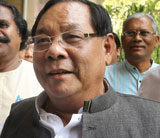
Idukki, Aug 7: Several people lost their lives and dozens of tea estate workers are feared trapped under soil in Kerala’s Munnar after torrential rains triggered a massive landslide on today.
As many as five bodies have been recovered and rescue workers are fighting inclement weather to remove the debris.
According to rescue workers, four lanes of quarters and a church are buried under mud and around 80 people are feared trapped.
Seven people have been rescued so far and shifted to the hospital.
Sources said a portion of Pettimudi came crashing down on the workers colony with a deafening roar in the wee hours of Friday.
As people were sleeping in the quarters, there was little time to escape.
Further, with the Periyavara bridge being washed away, it became all the more difficult for rescue workers to reach the spot.
The construction of a new temporary Periyavara bridge however, is underway.
The bridge was previously destructed during the deluge of August 2018. Later during the north west monsoons and the south west monsoon of 2019, it suffered damage again.
The present bridge, which got damaged on Thursday after Kannimala river levels rose, was constructed under the leadership of Coir fed.
Although a new concrete bridge has been constructed near the temporary bridge in Periyavara, vehicle movement has not been possible because the authorities are yet to build its approach via road.
The new bridge is to be constructed at a cost of Rs 4.75 crore from Devikulam MLA S Rajendran's fund.
The entire area has been cut off from outside world and communication networks have also crashed.
Teams of Fire and Rescue personnel, NDRF, revenue officials, estate workers and police are struggling to conduct rescue operations.
Meanwhile, District collector H Dhineshan said a team of rescue personnel was sent to Pettymudy after he was briefed about the mishap and search operations to locate and rescue people are underway.
Facilities have been arranged at the hospitals nearby to provide necessary treatment facilities to the people being rescued.







Comments
Add new comment